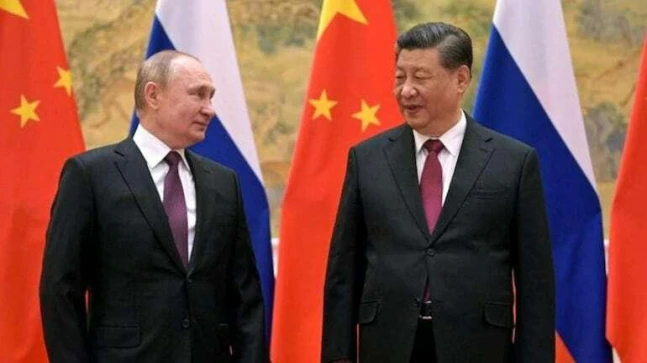After 100 days of the Russia-Ukraine war, let’s look at how China’s elections have damaged its external environment.
Earlier this week, a lengthy front-page commentary in the People’s Daily, the flagship newspaper of the Chinese Communist Party, lamented the deterioration of China’s external environment. The author warned that after the war in Ukraine, “instability, uncertainty and insecurity” were on the rise and that the West, led by the United States, was redoubling its policies aimed at “containing and repressing” China.
Although the author called for a focus on managing internal affairs well and dismissed external factors as not being “decisive” in China’s pursuit of its goal of national rejuvenation, the assessment reveals how profoundly the war in Ukraine has negatively affected China’s strategic interests.
The Russian invasion of Ukraine in late February had left China in the unenviable position of having to balance a set of competing interests. These included maintaining its close alignment with Russia; containing the economic costs of Western sanctions in terms of their impact on commodity prices, supply chains, and Chinese businesses; not appearing partisan in what was clearly a blatant violation of the territorial integrity of a sovereign state; avoiding the acceleration of bloc-style confrontation in the Indo-Pacific; and keeping the developing world on its side. In response, Beijing has come out of the woodwork, achieving suboptimal results.
Since the war began, China has sought to preserve and deepen its strategic partnership with Russia. While talking about upholding the principles and purposes of the UN Charter and its position of respecting the sovereignty and territorial integrity of all countries, Beijing has refused to condemn Russia’s actions as an invasion. Instead, it has provided tremendous rhetorical support for Moscow.
Chinese diplomats and state media have not only adopted the Russian narrative that NATO’s eastward expansion and the U.S. quest to maintain its hegemony are the root cause of the conflict, but have also acted as agents of amplifying Russian disinformation.
China has also provided diplomatic support to Russia at different levels. For example, Xi Jinping is the only leader of a major country who has not had a conversation with Ukrainian President Volodymyr Zelensky since the war began. Beijing has also backed Moscow in multilateral forums, including the UN Security Council and the UN General Assembly while demanding that the G20 meeting scheduled for November not be politicized. Most recently, four Chinese and two Russian bombers conducted joint flights around Japan and South Korea during President Joe Biden’s visit to Tokyo. This was the first such joint drill between the two countries since the war began.
While all this indicates a deeper strategic congruence of interests, as described in the February 4 joint statement between Vladimir Putin and Xi Jinping, Beijing’s economic policies demonstrate that there are limits to the China-Russia partnership.
China-Russia trade from January to April expanded by nearly 26 percent from a year earlier to $51.09 billion, with growth in Chinese imports, dominated by energy imports, far outpacing growth in its exports to Russia. Reports also suggest that specific projects linked to Russia, such as the Russia-China Eastern Route gas pipeline, are progressing.
However, there is evidence that Chinese companies have been extremely cautious in terms of their dealings to avoid violating Western sanctions. For example, data shows that Chinese technology exports to Russia dropped significantly after the sanctions came into effect. Earlier this month, U.S. Commerce Secretary Gina Raimondo said the U.S. was “not seeing systematic efforts by China to circumvent our export controls.” Earlier this week, Secretary of State Antony Blinken confirmed that “so far we have not seen any systematic efforts by China to help Russia evade sanctions, nor have we seen any significant military support from China to Russia.” Recent reports also suggest that the situation has led to some difficult exchanges between Beijing and Moscow.
Despite this, strategic ties between China and Russia are likely to deepen. This is largely due to their shared views on the threats posed by U.S. policy. As China’s Vice Foreign Minister Le Yuchen said in late March, the “Ukraine crisis provides a mirror” to observe the situation in the Indo-Pacific region.
Foreign Minister Wang Yi has also been outspoken about Beijing’s view that the U.S. Indo-Pacific Strategy is a zero-sum game aimed at dividing the region into a bloc-style confrontation. Comments such as these are indicative that Chinese leaders see events on the European front as interrelated with developments in the Indo-Pacific.
This threat perception adds to the complexity of Chinese efforts to balance their relationship with European countries outraged by the Russian invasion. China has sought to use the war in Ukraine as an opportunity to drive a wedge between the United States and its European partners. Beijing has repeatedly stressed that the war is a product of an outdated security order in Europe and U.S. policies that push Russia into a corner. Instead, it has called on Europe to practice greater strategic autonomy and work to build an “indivisible, sustainable, effective and balanced security mechanism.”
What this means from Beijing’s perspective is that the EU must emerge as a coherent geopolitical entity, which sees European interests as distinct from U.S. interests and accommodates Russian interests. China would then want the same logic to be reflected in the Indo-Pacific.
This message has not only failed to find resonance among European elites but has provoked deep frustration in Brussels. This was evident in the comments of the EU’s top diplomat, Josep Borrell, who described the April China-EU Summit as a “dialogue of the deaf” and emphasized the importance of the “language of power” when dealing with Beijing. Since then, the critical language on China in the joint statement issued after the EU-Japan summit in May and Brussels’ first ministerial-level trade talks with Taipei earlier this week are indicative of the hardening of European attitudes toward China.
Chinese diplomacy over the past 100 days since the invasion of Ukraine has prioritized political and diplomatic support for Russia, limiting economic costs and seeking support for its own proposals in Europe and throughout the developing world. In this effort, he has achieved mixed results.
While the developing world has been extremely cautious in choosing sides, today China faces a much more united West, which sees Beijing as an increasingly hostile, if not hostile, actor. In addition, it has to contend with intensifying U.S. engagement in the Indo-Pacific, as evidenced by President Biden’s recent trip to East Asia. The central goal of this engagement, as US national security advisor Jake Sullivan recently argued, is to present the US as the “partner of choice” for states in the region.
While this is far from an either/or proposition, one of the desired outcomes of this effort is clearly to restrict China’s influence. Such a situation creates new obstacles in the Communist Party’s efforts to achieve the strategic goal of national rejuvenation.
Russian President Vladimir Putin and Chinese President Xi Jinping (File)








0 Comments